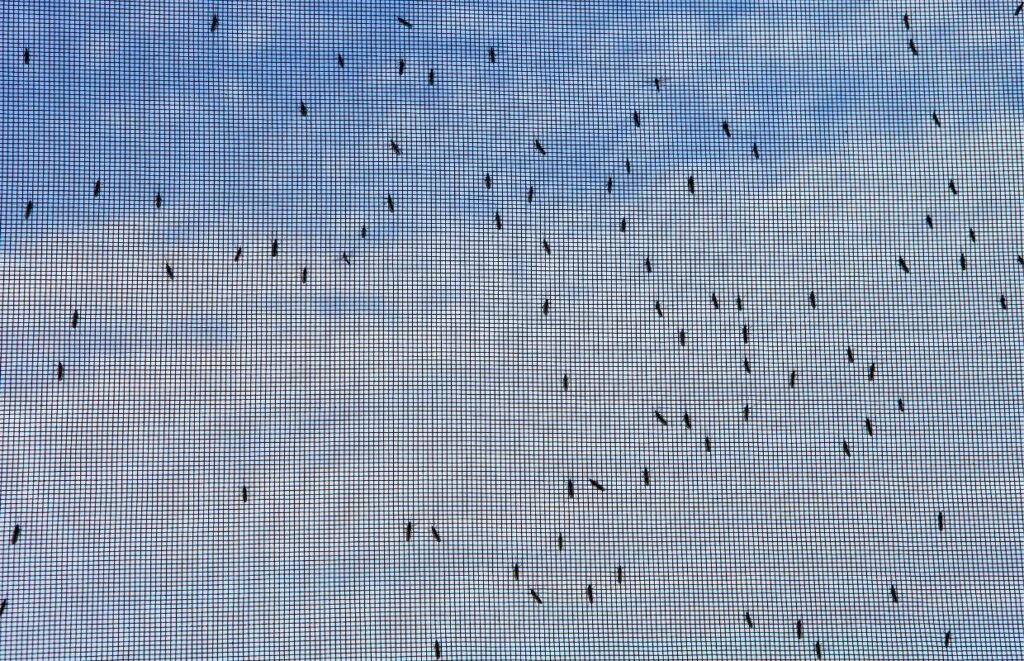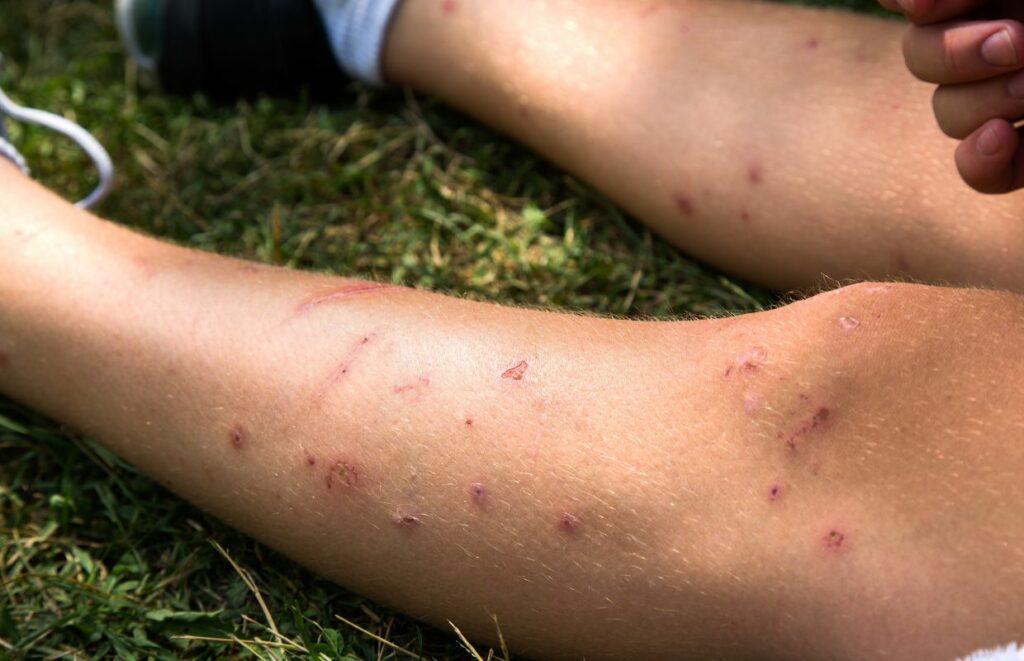Thailand is a popular destination for travellers looking for tropical beaches, delicious food, and a rich cultural experience. Unfortunately, it is also home to a large population of mosquitoes that can carry dangerous diseases such as malaria, dengue fever and other diseases you definitely don’t want. It is important to take measures to prevent mosquito bites while travelling in Thailand to avoid getting sick.

Understanding Mosquitoes in Thailand
Thailand is known for its tropical climate, which is perfect for mosquitoes to thrive in. Mosquitoes are annoying and can transmit diseases such as dengue fever, malaria, and chikungunya. Therefore, it is essential to understand the types of mosquitoes in Thailand, their peak hours, and breeding habits to prevent mosquito bites and reduce the risk of contracting mosquito-borne illnesses.
Types of Mosquitoes in Thailand
Two primary mosquito species in Thailand pose a threat to humans – the Aedes mosquito and the Anopheles mosquito. The Aedes mosquito is responsible for transmitting dengue, chikungunya, and Zika viruses, while the Anopheles mosquito is known for transmitting malaria.
Peak Mosquito Hours
Mosquitoes in Thailand are most active during the early morning and late afternoon hours. However, the Aedes mosquito is also active during the daytime, especially during the rainy season. Therefore, taking preventive measures throughout the day is crucial to avoid mosquito bites.
Breeding Habits
Mosquitoes breed in stagnant water, such as ponds, lakes, swamps, or small puddles left from the rain. It is essential to clean and change the water regularly if you have pools or places where you store water in your house. Mosquitoes can also breed in flower vases, discarded tires, and other items that collect water. Therefore, it is necessary to remove any standing water around your home.
Preventive Measures

When travelling to Thailand, it is important to take preventive measures against mosquitoes to avoid mosquito-borne illnesses. Here are some effective preventive measures to keep in mind:
Physical Barriers
Physical barriers such as mosquito nets, screened windows, and doors can be effective in preventing mosquitoes from entering your accommodation or outdoor dining spaces. Mosquito coils and plug-in repellents can also provide added protection against mosquitoes in your accommodation. Additionally, fans can help create a breeze that makes it difficult for mosquitoes to fly and land on you.
Insect Repellents
Insect repellents are an effective way to protect yourself from mosquito bites. DEET is the most effective active ingredient in insect repellents and is recommended by the Centers for Disease Control and Prevention (CDC). However, if you prefer a deet-free option, look for insect repellents that contain picaridin, lemon eucalyptus oil, or IR3535. Apply the repellent to all exposed skin, and reapply as needed.
Natural Methods
There are also natural methods to repel mosquitoes. Citronella, lemongrass, and eucalyptus oil are natural mosquito repellents that can be applied directly to the skin or used in candles or diffusers. Garlic can also be effective in repelling mosquitoes. Eating garlic or taking garlic supplements can change your natural scent, making it difficult for mosquitoes to find you.
Protective Clothing
Wearing protective clothing can also help prevent mosquito bites. Wear long-sleeved shirts and pants, and tuck your pants into your socks or shoes to prevent mosquitoes from biting your ankles. Use mosquito nets over your bed at night and wear a mosquito repellent bracelet for added protection. Additionally, treat your clothing with permethrin, an insecticide that repels and kills mosquitoes.
By taking these precautions, you can protect yourself against mosquito-borne illnesses and enjoy your time in Thailand without worrying about getting bitten.
Precautions for Outdoor Activities
When enjoying outdoor activities in Thailand, taking precautions against mosquitoes is essential. Here are some tips to help you stay protected while enjoying your time outdoors.
Hiking
When hiking in Thailand, wearing appropriate clothing is important to protect yourself from mosquito bites. Wear long-sleeved shirts and long trousers, preferably in light colours. Avoid wearing perfume or cologne, as mosquitoes are attracted to strong scents. Apply insect repellent to any exposed skin, and avoid scratching any insect bites you may already have to prevent infection.
Swimming
Swimming is a popular activity in Thailand, but taking precautions against mosquitoes while enjoying the water is important. Apply insect repellent before entering the water, and avoid scratching any bites you may already have. If you’re swimming in an area with a lot of mosquitoes, consider wearing special clothing designed to protect against insect bites .. or don’t!
Other Precautions
In addition to wearing appropriate clothing and using insect repellent, there are other precautions you can take to protect yourself from mosquitoes. Avoid spending time outdoors during the hottest part of the day, when mosquitoes are most active. Use a mosquito net when sleeping outdoors or in a poorly ventilated room. If you do get bitten by a mosquito, avoid scratching the bite to prevent infection.
These precautions allow you to enjoy your time outdoors in Thailand without worrying about mosquito bites. Remember always to be vigilant and take steps to protect yourself from mosquitoes, especially during the rainy season when mosquito activity is at its peak.
Precautions for Accommodation

Taking precautions to prevent mosquito bites is important, especially when staying in accommodations. Here are some tips to help you protect yourself from mosquitoes while staying in different types of accommodations:
Hotel or Guesthouse
When choosing a hotel or guesthouse, look for mosquito-proof accommodation, such as rooms with screened windows and doors or those with air conditioning. If these options are not available, you can use mosquito nets and other barriers to prevent mosquitoes from entering your room. You can also use mosquito coils, plug-in repellents, or anti-mosquito sprays to provide added protection against mosquitoes.
Another important thing to keep in mind is to eliminate standing water in and around the accommodation. Mosquitoes breed in stagnant water, so make sure to empty any containers that may collect water, such as flower pots or buckets.
Camping or Jungle Trekking
If you plan camping or jungle trekking, taking extra precautions to protect yourself from mosquitoes is important. Wear long-sleeved shirts and pants in dark colours, as mosquitoes are attracted to bright colours and exposed skin. You can also use lemon eucalyptus oil, which is a natural mosquito repellent, or anti-mosquito sprays.
In addition, make sure to bring antiseptic cream to treat any mosquito bites you may get. You can find these products at 7-Eleven stores or other convenience stores throughout Thailand.
Use you fan
Something else to keep in mind is to use a fan in your accommodation. Mosquitoes are weak fliers, so a fan can help keep them away from you while you sleep.
Taking these precautions can help prevent mosquito bites and enjoy your time in Thailand without any unwanted encounters with these pesky insects.
Dealing with Mosquito Bites

If you’ve been bitten by a mosquito in Thailand, it’s important to take steps to prevent infection and relieve the symptoms of the bite. Here are some tips to help you deal with mosquito bites:
Clean the Bite
The first step in dealing with a mosquito bite is to clean the area around the bite with soap and water. This will help to prevent infection and remove any dirt or debris that may have gotten into the bite.
Apply an Antiseptic Cream
After cleaning the bite, apply an antiseptic cream to the area. This will help to prevent infection and reduce the risk of the bite becoming inflamed.
Use Tiger Balm
Tiger Balm is a popular remedy for mosquito bites in Thailand. This herbal ointment contains camphor and menthol, which can help to relieve the itching and swelling associated with mosquito bites. Apply a small amount of Tiger Balm to the bite and massage it into the skin.
Other Remedies
There are many other natural remedies that can help to relieve the symptoms of mosquito bites. These include:
- Aloe Vera: The Aloe Vera plant gel can help soothe the skin and reduce inflammation.
- Basil: Crush fresh basil leaves and apply them to the bite to help reduce itching and swelling.
- Ice: Applying a cold compress to the bite can help to reduce swelling and relieve itching.
Remember, prevention is the best way to deal with mosquito bites. Use insect repellent, wear long sleeves and pants, and avoid being outside during peak mosquito hours (dawn and dusk) to reduce your risk of being bitten.
Medical Assistance
If you are planning to travel to Thailand, it is important to be aware of the risks of mosquito-borne diseases and take necessary precautions to avoid them. Before you go, be sure to consult a doctor about any vaccinations that are recommended and be sure to get travel insurance to cover any unforeseen circumstances.
However, it is important to seek medical assistance as soon as possible in case of any illness. Here are some important things to keep in mind:
Antimalarial Medication
Malaria is a serious mosquito-borne disease that can be fatal if not treated promptly. Antimalarial medication is available, and taking it before and after travelling to areas where malaria is prevalent is recommended. However, consulting with a travel health professional or doctor is important to determine the best course of action based on your health and travel plans.
Consulting a Doctor
If you experience symptoms such as fever, headache, muscle pain, or rash during or after your trip to Thailand, it is important to consult with a doctor as soon as possible. These symptoms may be indicative of mosquito-borne diseases such as dengue fever, chikungunya, or Zika virus. In severe cases, these diseases can lead to hospitalization or even death.
It is also important to note that mortality rates for mosquito-borne diseases vary depending on the disease and the individual’s health. However, it is always better to err on the side of caution and seek medical attention if you experience any symptoms.
In addition, it is important to stay informed about local mosquito-borne disease outbreaks and take necessary precautions such as using insect repellent, wearing protective clothing, and staying in air-conditioned or screened-in areas.
Overall, seeking medical assistance in case of illness is crucial for staying healthy and safe during your travels to Thailand.
Conclusion
Preventing mosquito bites in Thailand is essential to avoid mosquito-borne diseases such as dengue fever, malaria, and Zika virus. While it may not be possible to eliminate the risk of mosquito bites completely, there are several effective ways to reduce the risk.
Firstly, avoiding mosquito breeding grounds such as stagnant water is important. Regularly clean and change the water in pools, ponds, and other water storage areas around your home. Also, try to avoid outdoor areas during peak mosquito activity times, such as dawn and dusk.
Secondly, use mosquito repellents such as sprays, lotions, and coils to protect yourself from mosquito bites. Apply these products regularly, especially if you are spending time outdoors. Wearing light-coloured clothing and using mosquito nets can also provide additional protection.
Thirdly, taking steps to protect your home from mosquitoes can also reduce the risk of mosquito bites. Use screens on windows and doors, and consider using plug-in repellents or mosquito coils to keep mosquitoes away from your living spaces.
Finally, it is important to be vigilant and aware of the risk of mosquito-borne diseases in Thailand. If you experience symptoms such as fever, headache, or rash after being bitten by a mosquito, seek medical attention immediately.
By following these simple steps, you can reduce the risk of mosquito bites and enjoy your time in Thailand without worrying about mosquito-borne diseases.
